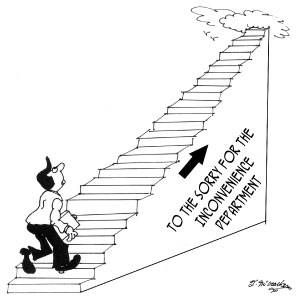Quit Talking to Yourself
 |
October 2012 Newsletter
|
|
Quit Talking to Yourself By Robert A. Kobek, RRP, President CustomerCount I have a mental discipline I work myself through every morning while scraping my face (the mirror is my sounding board). I work to come up with one new idea to enhance my products and services. Most often (by a really huge margin) they don’t make it past the point where I pull out of my garage. Some make it as far as my office and some even make it to the drawing board. But very few that make it past that. Of those that do, I attempt to draw some consensus among my coworkers the idea is worth pursuing. If they don’t agree, I drop it. Perhaps just as risky is they agree, we proceed down a path and it just doesn’t work. Both scenarios are dicey; both can lead to failure or prosperity. What is operative here though is that we, like most companies, talk to ourselves. We forget to listen. Typically, in large corporations, like GM for instance, believe it or not, it is marketing that leads the way. Engineering may not admit to that, nor would manufacturing necessarily agree, but consider this: Every amenity in your car, manufactured in the last ten years comes as a result of finding out what the buyer would want. Coupled with the awesome innovations that have come out of NASA (the computer chip for instance) and asking, researching, analyzing, parsing and then doing them all again, time after time we now have amenities that will even park your car. Through innovation NASA gave us everyday products like memory foam, smoke detectors, water filters and cordless tools. It also resulted in Tang and freeze dried foods. These innovations are the result of people looking outside for solutions, then acting on the information they gained. It is incredible what the voice of the customer can imagine and deliver.
|
| Take the timeshare industry for example. That group is wholly focused on providing the best vacation experience every time you stay at a resort. So much so that at one point very early in its history, there were no phones in the units. Fast forward to the now and most resorts have Wi-Fi to the guest unit, and at least have hot spots where guests can access the net. Dealing with the proliferation of the smart phone, many even have apps that can be accessed to gain information about the surrounding community. Where to eat, shop and sight see, check out of the resort, virtually every touch point. Yet, only very few savvy resort developers, marketers and operations teams actually attempt to gain customer feedback. They, like the very large bulk of companies operating, think they know what will attract visitors or new buyers, and keep the business they have. This causes what Theodore Levitt coined as “Marketing Myopia”. In 1975 (ancient history but very germane), Levitt makes the point that the railroad industry lost its dominance through the lack of recognition that they were actually in the transportation business. They forgot to work with existing and potential customers to find out just what business they were really in. Failure at the C-Suite level to recognize that trucking was taking advantage of the newly created interstate system was the threat that caused the slow but certain demise of a once dominant industry. Levitt scolds the C-Suite that is responsible for continually revisiting and reassessing the business they are in and the industries they serve. The last growth industry was replaced by a new growth industry and so on. The last growth company was replaced by a new growth company, the cycle of business life. Think Wang (if you are old enough): they thought they were in the word processing business and didn’t see the entire word processing industry until it was eating them alive. IBM passed on DOS (so did Job’s, thus Apple), but hey, we can’t all be rocket scientists now can we? But, we can start listening to the world outside of our own. All you have to do is ask and you will quit talking to yourselves. Talking to myself when I shave is my way of getting my intellect jump started (I wake up at a disadvantage and hope it gets better as the day wears on). It is not my way of pushing the bar. I let my clients direct me and I do my very best to listen, and I am not afraid to ask. |
 |
 |
 |
 |



